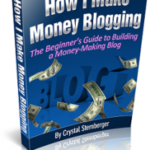This is a follow-up to part 6 of the niche site walkthrough, Setting Up a Niche Site. If you haven’t read that post, this one won’t mean much. Go ahead. Read it. I’ll wait.
Several people have asked me to explain why I use the plugins and settings I use. In this installment of the Make Extra Money series, I’m going to explain every choice I recommended last time.
WordPress
WordPress is a site development dream. With the right themes and plugins, you can literally make a WordPress site look, feel, and behave in any way you wish. Even without digging too deep into plugins and premium themes like Headway, you can put together a niche site blog in very little time and know that it’s happening on a robust platform that is actively being improved.
Configuring WordPress
Updates
Keeping your site updated is the single most important thing you can do to avoid getting hacked. Since I haven’t yet figured out how to make hacking a terminal disease, I do the best I can to avoid letting them cause problems. Keeping your site updated is the condom of WordPress.
WWW
This is entirely a personal preference, but, after 20 years of reinforcing habits, most people type “www” by default. WordPress will automatically forward visitors correctly, so this isn’t actually a necessity.
The “Misc” Category
I don’t spend much time worrying about categories when I post, and sometimes I experiment with using external software to post from pools of articles, so I set up a default category. “Misc” is much nicer to see than “Uncategorized”, even if they mean the same thing.
Theme Selection
I like SimpleX because it is uncluttered and easy to navigate. It’s hardly the most powerful theme out there, but it doesn’t pretend to be. If I want more, I use Headway.
Plugins
Plugin Central
Plugin Central is just a plugin installer that lets you install and activate many plugins at once. Even knowing exactly what plugins you want, this easily saves half an hour of setup time.
All in One SEO Pack
SEO is important. In fact, it’s what I base my niche site traffic on. All in One SEO makes it easy to manage the SEO titles that search engines see and the meta descriptions that search engine’s display to visitors when they see your site after a search. Some themes do this themselves, but I still use this plugin.
Meta keywords are all but useless, but not entirely. Google and Bing don’t care, but some networking and sharing sites do.
I “noindex” the tag archives because I don’t want the search engines finding each page twice. Identical pages with different addresses will register as two pages with Google. How does it know which one I consider most important? It doesn’t, so I don’t give it the option of indexing my tag archives.
Contact Form 7
This is just a free and easy contact form. I haven’t found anything better for the price.
WordPress Database Backup
Backups are important. Always back up your data. Do you want to spend 3 weeks building a site, just to have your server crash, killing everything? 5 minutes now will save hours or days of headache later.
SEO SearchTerms Tagging 2
When someone comes to your site from a search engine, this plugin takes the term they searched for and appends it in a list at the end of the post the visitor found. This reinforces your site as a good result for that search term. It also provides a handy list of the most popular search terms people use to find your site.
Conditional CAPTCHA for WordPress
I hate spam. If Akismet finds a spam comment being posted, this plugin will give the user a change to enter a CAPTCHA code to post the comment. Even if I turn off comments on a site, I keep this installed in case I ever change my mind. Real comments are good for SEO, so I occasionally test allowing the comments. I won’t waste the time moderating comments on a niche site, so this is a good compromise.
Date Exclusion SEO
If someone comes to a site and sees the last post was two years ago, they’ll leave. I don’t want a post to look like it’s outdated, so I suppress the dates.
Pretty Link Lite
This plugin lets me mask a link and set it to nofollow. Nofollow tells the search engines to discount the value of the link, which removes a spam-site indicator from their algorithms. Masking the link turns a messy affiliate link into a link that looks internal, making it easier for a visitor to click and allowing you to see how often a link is clicked.
Google XML Sitemaps
Making it easy for Google to find your entire site is a good thing. This plugin helps with that.
WP Policies
This plugin provides a long list of site policies, formatted for a WordPress page. The most important one is the disclaimer announcing the fact that your are making money on your site.
WP Super Cache
Super Cache creates a pre-generated copy of your page so the site doesn’t have to hit the database to rebuild it dynamically every time someone visits. It’s all about speed, which affects your search rank.
JetPack
I like using the WordPress.com stats instead of Google Analytics for most of my niche site. I don’t see a need to announce to Google that these 12 sites are owned by me, so I don’t. WordPress.com included their stats plugin in JetPack, then discontinued the standalone plugin, so I use JetPack.
Backup
If I subscribe to my own feed, I get every post in Google Reader. That means I don’t need to make a daily backup of any of my sites. For the amount of changes I make to my niche sites, weekly might still be overkill, but that’s what I do. I get the backups by email so I have a copy somewhere other than the host. I don’t believe in letting anyone control my money but me.
Settings
Discussion
Most comments to niche sites are spam comments, so I hide them without actually turning them off. Sometimes I test letting the comments through, because some niches might have great people that want to post good comments. I haven’t had a lot of luck with that, on my niche sites.
Permalinks
The default permalink structure is absolutely not recommended for search engine purposes. It’s also harder for someone to mention. I don’t put dates in the link for the same reason I hide dates in the posts: I don’t want anything to look outdated.
Menus
I keep the navigation menu simple. It has three purposes:
- Link to the page that’s designed to make money.
- Link to the pages that show Google and readers it is an active site.
- Link to the disclaimer that keeps my butt away from federal fines.
Anything else is wasted space.
Widgets
On my niche sites, I use widgets to help with navigation and to point people to the pages that will make the most money. I haven’t addressed how I do the second part yet, because I haven’t created those pages yet.
Posts
Right now, http://www.masterweddingplanning.net/ has exactly one post, and it’s a duplicated post from eZineArticles. It has served its purpose. This site is fully indexed by Google.
When I get the rest of the content written, I’ll delete that post.
There you have it, the reasons behind every choice I make during site creation. Did I miss anything? Do you have any other questions?


 budget” width=”300″ height=”213″ />We are almost following his
budget” width=”300″ height=”213″ />We are almost following his 


